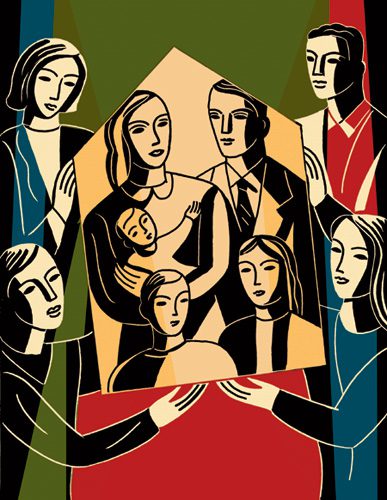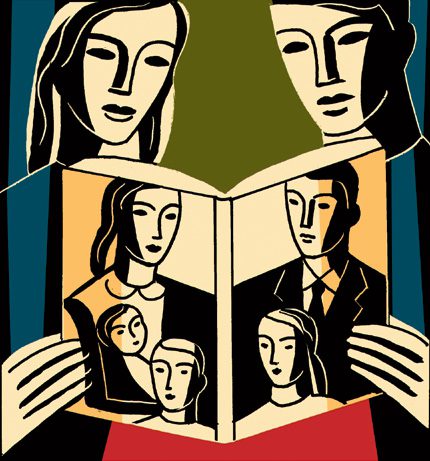By Peter B. Garder, ‘98, Associate Editor

One of BYU’s newest General Education courses and its companion textbook help students of the family – from scholars to spouses – deepen their understanding, enhance their relationships, and embolden their advocacy.
The class schedule for fall semester 2000 seemed normal enough. But amid its cryptic columns of class numbers, instructor names, and room assignments sat an unassuming addition–FamLf 100. The new class’s few lines were hardly noticeable in the schedule’s plodding procession of BYU course offerings. But that minor change to the class schedule marked the beginning of a major development in
BYU‘s School of Family Life. By the first day of class, word had spread about FamLf 100, or Strengthening Marriage and Family: Proclamation Principles and Scholarship, and classrooms for the six sections were packed with already-enrolled students and numerous hopefuls with add cards in hand. The draw for many was the course’s unusual mission. Others were attracted by the text, a 424-page work created at BYU specifically for the class. With a blend of modern revelation and scientific research, the course and text are designed to counter worldly doctrines that undermine the family and to support the principles of the family proclamation issued by The Church of Jesus Christ of Latter-day Saints.
“That was the most important class I’ve taken at BYU,” says Noel Millard Hinton, ’01, a marriage, family, and human development (MFHD) major from North Salt Lake, Utah. Recently married, Hinton says she especially valued the practical advice for families just starting out.
“Today’s world is dominated by individualism, materialism, hedonism, and secularism,” says David C. Dollahite, ’83, an associate professor of family life and a teacher of the class, “and together these philosophies create a brew that is very anti-family and anti-faith.”
Paul D. Sigafus, ’01, an MFHD major from Montrose, Colo., sees the course as a way to defend the family in society. “If Satan is stepping up his efforts to destroy the family, why not step up ours to preserve and strengthen it?”
A Consecrated Effort
“This class differs from others in the sense that we have a textbook for it that I can wholly subscribe to,” says Shirley R. Klein, ’84, an associate professor of family life and a teacher of the proclamation class. “In another class we survey a lot of texts out there and pick the one that’s the least offensive when it talks about relationships. But with this text you can have full confidence that you’re covering a lot of really important bases in a way that’s meaningful and helpful to this audience.”
Published by Deseret Book, Strengthening Our Families: An In-Depth Look at the Proclamation on the Family was tailor-made to fit the course. The book was so well received that it seems nearly all involved with the class or text (students, teachers, and authors) have given copies of the book away–but not their personal copies. In fact, only 7 percent of the students sold their books back at the end of the semester, compared with a normal sell-back rate of 70 percent. Its popularity on campus was matched by an enthusiastic reception among the general Church audience, quickly sending the book into a second printing to meet the demand.
It all began with Church President Gordon B. Hinckley’s reading of the proclamation in September 1995. Faculty and administration across campus, and particularly in the family sciences, sought ways to weave its tenets into the fabric of BYU. Alan J. Hawkins, ’79, an associate professor of family life and associate director of the School of Family Life, says they “wanted to respond in a way that would show that this document is not only inspired and contains great religious truth but has tremendous support from good scholarship out there.”
Two ideas precipitated from various brainstorming sessions: a class and a textbook featuring scholarship on a wide range of family issues. Hawkins and Dollahite, who was asked to serve as the book’s editor, felt there would be a special blessing on this massive undertaking if it were accomplished in a “Zion-like” way–meaning no one involved would receive monetary compensation. This plan would help reduce the cost of the book for students and allow all royalties to go toward family studies scholarships and research grants.
In March 1998 Dollahite sent out a call for chapter proposals. Before long, ideas were streaming into his office from every corner of campus and beyond. Along with expected proposals from family life, sociology, and religion professors came ideas from faculty in such areas as English, botany and range science, physics and astronomy, organizational behavior, linguistics, music, modern dance, and law. The book would eventually include the work of 101 professors, graduate students, and family specialists in 31 disciplines at eight universities. All of the authors were either BYU professors, students, or alumni. And because of overlapping proposals, all but five of the 27 chapters would involve collaboration among authors, two with 11 contributors each. “When you get people from different disciplines, the product becomes more rich, deep, and nuanced,” says Dollahite.
B. Kent Harrison, ’55, now an emeritus professor of physics and astronomy, submitted a proposal on domestic abuse. Though his life’s research had focused on the theory of general relativity and gravitation, his long interest in women’s issues led him to study and crusade against domestic abuse. “I felt the Lord’s Spirit was with us in doing this,” he says of coauthoring a chapter in the book.
Assistant professor of Church history and doctrine Lloyd D. Newell, ’80,whose PhD is in marriage and family, found it refreshing to write for this book. “So often when you write for a scholarly audience, you feel like you can’t really say all that your heart contains,” he says. “Here we were able to use all our academic preparation and do rigorous research, but we were also able to use our faith and bring those together in powerful ways.”
Many of the writers had published widely in academic journals on their respective subjects. But unlike scholarly writing, this material was aimed at a lay audience. “It’s a challenge,” says Dollahite, “to have a book be really thorough and comprehensive and rigorous and cautious–but also interesting.”
To make sure the writing style hit the mark, the editorial committee set up a series of pilot classes, where students could critique chapters as they were written. For three consecutive semesters, roles reversed as students evaluated teachers’ evolving drafts for clarity, applicability, and appeal. Suggestions often included simplifying scholarly terminology and illustrating concepts with examples and stories.

“I’ve realized that first we need to strengthen our own family, and then we need to help other people do the same.” – Noel Hinton
Maribeth C. Clarke, ’80, an associate professor of family life and an author of a chapter on the home, welcomed the students’ suggestions. “Seeing the way they were thinking channeled your writing in a different direction,” she says.
A validating moment came on Sept. 10, 1998, at the inauguration of the new School of Family Life at BYU, when Acting President of the Quorum of the Twelve Apostles Boyd K. Packer, ’62, encouraged faculty members to use the proclamation as their foundational document. He further charged them to create, without apology, texts melding spiritual truth with the best secular research on the family.
“That’s exactly where we were headed,” says Dollahite. “We had all come to the same conclusion.”
So much effort by so many authors for so little recompense and recognition, says Dollahite, was a great sacrifice. “Many of my colleagues put in a lot more time, energy, effort, and blood, sweat, and tears for their chapter for the proclamation book than they do for their scholarly writing,” he says. “They did it out of love for the students and love for the proclamation.”
Strengthening Marriage and Family
“How does understanding these common challenges that face newly married couples help us go forward with faith in marriage?” Professor Klein asks near the end of a lecture on the importance of creating stable, lasting marriages.
After a moment’s hesitation, five or six hands, many adorned with rings on the third finger, rise.
“Well, I’ve been married for about a year, and some things have been hard,” one student offers. “But knowing that most couples face similar frustrations and can work through them is encouraging.”
Another responds, “I’m not married yet, but I think trying to live the principles of the proclamation could help me avoid, or at least minimize, many of these problems in marriage.”
Class discussions, readings, and projects are all based on a three-pronged goal for students: to increase their understanding and testimony of proclamation principles, to move forward with faith in their familial relationships, and to share and defend the truths they learn.
Professor Newell, who teaches a section of the class, sees the class as an ideal forum for learning about family issues. “There’s no other place where you can get this cutting-edge family research along with an excellent overview of what prophets have said and see how they complement each other. It’s marvelous,” he says. The book contains some 800 references to scholarly studies that support the words of the prophets.

“To have an opportunity to influence students about their marriage and family – which are going to alst them forever – is a huge responsibility.” – Shirley R. Klein.
Based on readings from the book, discussions in class help students move forward with faith in every season of family life, from advising them on the crucial marriage decision to tackling debilitating social epidemics to suggesting ways to reclaim wayward children to encouraging wholesome family traditions.
“To have an opportunity to influence students about their marriage and family–which are going to last them forever–is a huge responsibility,” says Klein.
Megan Boyer Overton, ’00, an MFHD major, persuaded her business major husband, Ryan M. Overton, ’02, to take the class with her. “The readings provided us with a good opportunity to get together on how we felt about these things,” she says. As parents of one daughter with another on the way, they created a parenting inventory of ideas distilled from the book and class as a joint class project.
Ryan says he never considered selling the book back. “We’ll probably use it as we get older. It’s a reference guide; it’s something you can use your whole life.”
The class emphasizes other family relationships as well. Tyler J. Livingstone, ’02, an MFHD major from Los Angeles, felt inspired by the proclamation’s emphasis on forgiveness to resolve a long-standing miscommunication with his father. “It’s been really good,” he says. “I’d been thinking about fixing the relationship, but the class was the impetus.”
Sharing and defending the truths of the proclamation has become a major thrust of the class. “We want students to emerge with greater confidence in their ability to communicate what they believe,” says Hawkins. He says that the scholarly support for the proclamation provides students with “a language that is persuasive and that establishes commonality rather than builds a barrier of sectarianism.”
From class projects to essay questions on tests, instructors challenge students to consider ways to expand the proclamation’s influence among their family, friends, and community.
“We try to bring it to a personal level,” says Klein of student projects to share and defend the proclamation. “Students have written a letter to a senator or an editor. Or a student might try to convince a friend who’s thinking about moving in with a boyfriend to do otherwise.”
“Our hope is that they take this to their businesses, church groups, and community organizations as strong advocates for families and moral principles,” Newell says.
“It’s not a proclamation to the Mormon families of the world. It’s a proclamation to the entire world,” says Hinton. “I’ve realized that first we need to strengthen our own family, and then we need to help other people do the same.”
To determine the class’s effectiveness on these fronts, the instructors conducted a survey at the end of the course and were excited by the students’ answers. More than 75 percent of the students said that they feel more confident in their ability to build a strong marriage and be a good parent because of the class; nearly as many responded that the class had increased their confidence in their ability to share and defend marriage and family in secular settings; and 97 percent said they were likely to recommend the class to friends.
This success has the teachers and School of Family Life looking for ways to extend the class’s reach. Accordingly, the course listing in the class schedule is becoming more conspicuous as sections are added and teachers trained to meet increasing demand. Also, this spring the class was granted general education status as a social and behavioral sciences elective, and the administration is exploring the possibility of making it available online. The class has even been exported to Rexburg, Idaho, where it will be taught at BYU–Idaho for the first time in fall 2001.
For those involved with the class and book, the importance of the proclamation justifies the monumental effort that went into creating them. “I think this is one of the most important things BYU has done,” says Newell. “It’s the kind of thing BYU ought to be doing.”









